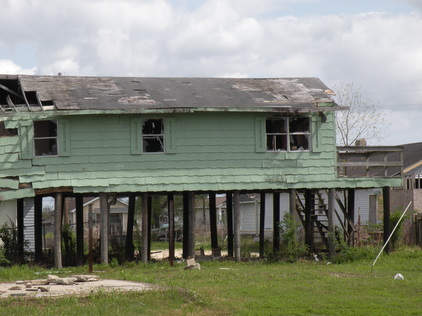
Last year at this time I spent spring break going on a service trip with my college to New Orleans, spending a week rebuilding homes. During the trip we kept a group journal which was later typed up and sent to everyone. I thought I would revisit the trip a year removed from the experience. The words I wrote jumped off the page. Before I explain why, here are a couple excerpts:
March 13, 2011
Today during our large group reflection a common theme was the frustration over government inefficiency in solving the many problems presented in the city. Ultimately what it boils down to is the current state of the city, and particularly its education system, simply is not good enough. As a nation we need to hold ourselves to a higher standard – the wealthiest nation in the world should not have desolated communities such as the ones we saw today. While perhaps this is a bit idealistic, I am hopeful that we as a generation, and as engaged Dickinsonians, can work to improve these communities by attacking flawed, corrupt systems of oppression and implementing innovative and comprehensive policies to create lasting change. This is a broad idea in theory however, as it is abundantly clear that these problems are complex beyond our comprehension. I found myself dumbfounded today to see homes completely refurbished that would fit well into any normal neighborhood, surrounded by abandoned homes, clearly destroyed by the storm.
While we all will learn a lot during our time here, I believe it is important to recognize that our understanding of the problems facing New Orleans and the effects of Hurricane Katrina will always be limited. We can hear survivor’s stories, see the destruction and experience the culture, but we will never be able to fully comprehend what this city and these people have gone through. It is with this approach of humility that I hope to attempt to grasp the infinitely complex problems presented, all the while doing my best to lend a helping hand. This week we will be making a small contribution to rebuilding New Orleans by repairing homes. However, I believe the lessons we all learn and the experiences we all have this week will lead to a changed mindset, forever reminding us of the desperate need for compassion and understanding in this world.
March 17, 2011
A strong focus of this trip has been actively reflecting on our experiences. While I believe this is a valuable activity, something I have learned is how the most valuable reflections have come after much time has passed. It can take weeks, months, and even years to learn all the lessons from one specific trip or experience. I’m sure that my reflections of this trip will continue to grow and change as time distances itself from this moment.
While New Orleans and Pohnpei are on the opposite ends of the globe, it has become abundantly clear that many of the problems facing these developing communities are the same. In my journal entry, along with many of the others written by my classmates, it was cited how frustrating it is to witness government inefficiency and lack of action. Well, if you thought American bureaucracy can be a headache, you haven’t been to Pohnpei! The fact that I then went on to specifically state how the “education system simply isn’t good enough” made me laugh considering what I have been doing the past five months.
Looking at what I wrote, I see a fundamental shift in my approach to social change. Specifically, this sentence stood out: “While perhaps this is a bit idealistic, I am hopeful that we as a generation, and as engaged Dickinsonians, can work to improve these communities by attacking flawed, corrupt systems of oppression and implementing innovative and comprehensive policies to create lasting change.” I read this now and shudder. Even if you look back to my October and November posts, I used this type of language. Let's dissect it: It is well written, and uses several big words and phrases when it comes to social change like “systems of oppression,” “innovative and comprehensive,” and “lasting change.” I read it and it sounds very appealing – who wouldn’t want to attack “systems of oppression,” being “innovative” to create “lasting change?”
Here’s my point: it’s all talk. When the rubber hits the road, big sentences like this might sound good, and maybe help people open their wallets to support whatever cause, but it doesn’t do anything. It’s not necessarily wrong to talk like this, but if it’s not supported with action, it doesn’t do anything but inflate the ego of the speaker. When it comes to social change, especially in developing communities, it is essential that the leaders are men and women of action.
I’m really happy though that I followed up that “big” sentence with acknowledging that it is “abundantly clear that these problems are complex beyond our comprehension.” I knew when I went to New Orleans for only a week that I would not even start to slightly understand the problems that the communities there are facing. I thought however after spending five plus months on this tiny isolated island in the middle of the Pacific I would begin to grasp how to address the many problems on the island. Today I found myself saying, “The longer I stay here the more confused I get at how we can help this place.”
I think that whenever attempting community reform we will find ourselves saying something similar to this. There are just so many factors – culture, government, race, education, history, religion – the list goes on and on. From New Orleans to Pohnpei, Somalia to Lima, Peru, Afghanistan to Sierra Leone, the difficulties in bringing “lasting change” to a developing community are vast and remarkably complex. There are no silver bullet solutions, despite how tempting it might be to search for them. I have become more and more convinced however, as evidenced in my last post, that when tackling any type of social change, the best and most effective approach is not attempting to reform a government policy or institution. Rather, it is to take an individual approach, working with the members of the community, learning how as an outsider you can best serve them in their efforts to better themselves and their community. This is a much less attractive approach – it doesn’t have the glitz and glamor of “fighting systems of oppression” and it certainly is much more difficult than finding the silver bullet solution. But in the end what’s most important?
I look back a year ago in my week in NOLA with fond memories of friendships that were strengthened and created and being surrounded by like-minded peers who chose to attempt to grasp the complex problems of the world for a week rather than having fuzzy memories of a night on some beach. We left an indelible mark on the communities where we served, making them one step closer to recovery. We weren't working to reform vast institutions. Instead, we worked to help individuals, serving them the best way we knew how. As far as the future of New Orleans goes, I’m sure that most of us can look back at our time there and conclude that we learned a lot but ultimately left with more questions than answers.
This struggle persists and always will. There is no utopia, no happily ever after. However, I have been taught by several individuals, and have come to believe, that there is always hope. I know this is cheesy but let me explain. I’m reading a biography on Abraham Lincoln, entitled “Team of Rivals: The Political Genius of Abraham Lincoln” by Doris Kearns Goodwin. In the book, Goodwin describes how Lincoln was “acutely aware of his own emotional needs,” finding rejuvenation and relief in several ways from the overwhelming burden of leading America through its most perilous years. Goodwin goes on to reference Daniel Goleman’s study on emotional intelligence which states, “Having hope means that one will not give in to overwhelming anxiety, a defeatist attitude, or depression in the face of difficult challenges or setbacks. [Hope is] more than the sunny view that everything will turn out all right, [it is] believing you have the will and the way to accomplish your goals” (631). Goodwin then writes, “More clearly than his colleagues, Lincoln understood that numerous setbacks were inevitable before the war could be brought to a close. Yet in the end, he firmly believed the North would prevail.”
All those in the field of social change, especially those working in developing communities, could learn from Lincoln and his emotional intelligence. While there will inevitably be countless challenges and a never-ending stream of questions, if we have hope we are armed with the power to make a difference. And that is needed everywhere in the world, from New Orleans to Pohnpei.


